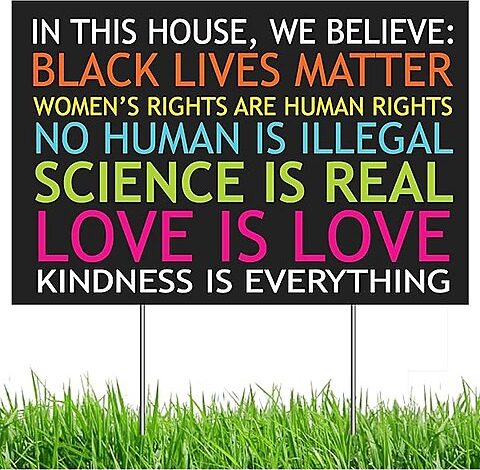Yard-Sign Libertarianism and Kamalamania

The other week, I did some get-off-my lawn grumbling about “libertarians these days.” When Donald Trump came down that escalator, I suggested, he didn’t just scramble everyone else’s brain: he took up rent-free residence in the libertarian mind as well. One faction of the movement went hard-core #MAGA; another “shifted hard in the opposite direction: toward Blue-Team ‘mood affiliation.’” For lack of a better term, I called the latter tendency “Yard Sign Libertarianism,” after the “In This House We Believe…” lawn flair favored by forward-thinking urban gentry. More a “vibe shift” than a competing ideological framework, the new orientation tends to privilege style over substance and presupposes that “left-wing cultural sensibilities [are] an essential part of the libertarian package.”
Now, thanks to a provocative piece from friend and former Catoite Jacob Grier, I’ve got a new excuse to grumble. The essay in question, “To My Fellow Libertarians: It’s Time to Embrace the Harris-Walz Ticket,” isn’t the “lesser of two evils,” suck-it-up-and-pull-the-lever approach libertarians typically adopt when faced with grim major-party choices. Instead, It’s a message of hope: there’s a Joy Train coming, libertarians, get on board:
“My libertarian friends, I’m telling you: It’s OK to get excited about a major party ticket. You should endorse Harris and Walz, not with reluctance but with genuine enthusiasm.”
Reluctance I can understand; but what’s the argument for enthusiasm? The case Grier makes is pot-forward and prog-friendly: Harris-Walz is the “first major party ticket ever to support legalizing cannabis”; they’re also dovish on crime, pro-abortion rights, and generally exhibit humane, pluralistic values. As libertarian nourishment goes, I find it more than a few crumbs short of the full brownie.
“The Democratic nominees offer quite a bit for libertarians to like,” Grier writes, starting with their position on pot. “Harris has become admirably liberal on cannabis,” and now supports federal legalization. This would be nice, but in terms of reducing federal oppression, it’s not exactly cause for excitement. “There are no individuals currently in federal prison solely for simple possession of marijuana,” a senior administration official admitted in October 2022, when President Biden issued a blanket pardon for pot-possession offenses. The War on Weed is mostly a state issue and even there hostilities have long been winding down.
Next, we hear that Harris’s running mate, Minnesota Governor Tim Walz, has “a solid record of criminal justice reform,” which includes “eliminating life-without-parole sentences for teenagers.” Once again, I’m underwhelmed. Is there some kind of libertarian first principle that says no act of aggression committed before the age of 18 can justify putting someone away for life? Does it extend to “beating and stabbing a 17-year-old girl to death with a screwdriver” or “stabbing a woman more than 100 times and killing a 10-year-old boy by hitting him with a TV”?
On abortion—another issue with no obvious libertarian answer—Grier writes that “even if [Harris’s] administration is unable to restore Roe, it can take significant steps to ensure access to abortion.” He links to a piece arguing that President Harris could issue (constitutionally dubious) executive orders promoting abortion access and, with the help of Congress, force dissenting taxpayers to fund it. If you’re pro-life—or if you generally oppose federal intervention in this area—this won’t move you.
The rest of the libertarian case for Kamala is a melange of Yard-Sign sentiments: Walz “seems to have some YIMBY cred,” and deserves praise for serving as faculty adviser to the gay-straight alliance at a Minnesota high school in the era of Don’t‑Ask-Don’t‑Tell, a “small act of human decency, but part of a larger arc demonstrating the triumph of liberal values.”
Okay, but Kindness Isn’t Everything when it comes to public policy. In this house, we believe in “a wise and frugal government, which shall restrain men from injuring one another, [and] shall leave them otherwise free to regulate their own pursuits of industry and improvement.” On that metric, the Harris-Walz ticket is truly dreadful, even grading on a politician’s curve.
As California’s junior senator, Harris racked up a 100 percent lifetime record on the AFL-CIO scorecard, a 4 percent rating from the Club for Growth, and an overall voting tally that makes her “the second-most liberal Democratic senator to serve in the Senate in the 21st century.” Her running mate had a disastrous fiscal record as governor of Minnesota, earning an “F” on Cato’s Governor’s Report Card.
The ticket is, moreover, godawful on free speech: In her 2020 bid, Harris pledged to hold social media companies “accountable for the hate infiltrating their platforms, because they have a responsibility to help fight against this threat to our democracy.” In office, the Biden-Harris administration engaged in a massive, covert effort to suppress core political speech, “from supporting a massive censorship system (described by a federal court as an ‘Orwellian Ministry of Truth’) to funding blacklisting operations targeting groups and individuals with opposing views.” They’re unrepentant and poised to do it again: Walz recently went on MSNBC to proclaim that “there’s no guarantee to free speech on misinformation or hate speech, and especially around our democracy.”
And if Harris and Walz are relatively dovish on the War on Drugs, maybe it’s because they’re channeling all their martial zeal into the War on Prices. The up-till-now policy-free campaign just unveiled its new centerpiece: price controls. The ticket promises to enact “the first-ever federal ban on price gouging on food and groceries,” enforced by the Federal Trade Commission. Oh, joy.
When it comes to the negative part of Grier’s case, his bill of particulars against Donald Trump, I don’t find much to quibble with. I spent the bulk of the 45th president’s tenure arguing that he should be impeached and removed from office—and, at the end, constitutionally disqualified from running again.
It’s depressing that we elected this sort of character in the first place and that we may be poised to do it again. It’s as dispiriting as hell that four years of liberal caterwauling about our near-miss with fascism didn’t lead to any sustained effort to “tyrant-proof” the presidency. And it’s beyond appalling that the best alternative to Trump 2.0 the Democrats could come up with is Kamala Harris: a thoroughgoing statist, crashing mediocrity, and someone who makes you marvel that in living memory, Americans actually worried that Dan Quayle was too big an airhead to be safely placed “a heartbeat away from the presidency.”
In the George W. Bush years, it used to irk me to no end when libertarians gave GOP candidates a pass on war and surveillance just for sounding the right notes on “big government.” Back then, I wrote a critique of fusionism warning that “habits of the mind developed during the long conservative-libertarian alliance may cloud libertarian thinking about how much common ground there is to our Right.” The latter-day trend toward Blue-Team “allyship” clearly presents similar dangers.
I’m not sure how I ended up becoming a “professional libertarian.” Quite plausibly, I should have done something else with my life. But looking back on what drew me down this path, I think it was a congenital affinity for “the first principle of libertarian social analysis”: skepticism toward power. Instead of joining a team, I liked the idea of (loosely) affiliating with people who didn’t care about politics and thought you should call things as you see them, without fear or favor. This is why I have zero interest in any version of libertarianism that reduces itself to an anti-Trump lifestyle brand.
This is also why it seems to me that, when confronted with a choice between two people who have absolutely no business being president, it’s perfectly okay not to vote. And yet, If you’re convinced one of these lessers is so evil that you need to vote as a matter of self-defense, more power to you.
But, as a libertarian, I can’t fathom approaching the task with genuine enthusiasm for either major-party choice—especially this year. The case for being a “double hater” has never been so easily made. But don’t just hate the players—hate the game.





